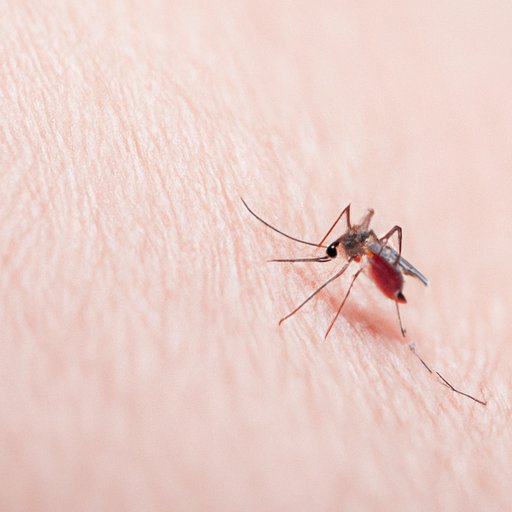Introduction
Have you ever spent a summer evening heedlessly scratching at itchy red dots across your skin? Chances are these bites were from pesky mosquitoes found all around the world. However, what if it’s not just typical mosquito bites that have you itchy, but it’s a mosquito bite allergy?
Mosquito bite allergies are more common than you may think. While most people experience only minor discomfort, others can suffer from severe and dangerous symptoms. In this article, we will explore everything you need to know about mosquito bite allergies, including symptoms, prevention, causes, and treatments.
The Buzz on Mosquito Bites: Could You Be Allergic?
Most people will develop mild to moderate reactions to mosquito bites, such as swelling, redness, and itching. Others, on the other hand, may develop a more severe allergic reaction. This is typically caused by an immune system reaction to compounds in mosquito saliva when they’re feeding.
Symptoms of mosquito bite allergies can vary, but the most common ones include:
- Swelling and redness beyond the bite area.
- Large-sized or blister-like bumps.
- Feeling sick or feverish.
- Difficulty breathing or wheezing.
- Anaphylaxis (a rare, life-threatening allergic reaction) – causing a rapid drop in blood pressure and loss of consciousness.
If you experience an allergic reaction due to mosquito bites, it is essential to seek medical attention immediately to avoid any severe reactions.
Summer Season Worry: Mosquito Bites Allergy and How to Avoid It
Mosquitoes are most active and abundant during the hot and humid summer months. Unfortunately, this means that allergies to mosquito bites can be more common during this time.
To avoid mosquito bites and reduce your allergic reactions, follow these tips:
- Cover up your skin when you’re outdoors, particularly during dawn and dusk when mosquitoes are most active.
- Use mosquito repellents such as DEET or picaridin to deter mosquito bites if you’re in an area with mosquitoes.
- Maintain a mosquito-free environment by eliminating standing water near your home or apartment, which mosquitoes require to breed.
- Use medicated creams or ointments to relieve the itching of mosquito bites, such as Over-The-Counter (OTC) antihistamines and pain relievers.
Beyond the Itch: What You Need to Know About Mosquito Bite Allergies
Allergies to mosquito bites can be more than simply itchy and irritating. For some people, mosquito bite allergies can be disabling and life-threatening.
In people with mosquito bite allergies, the immune system mistakenly identifies proteins in mosquito saliva as harmful and creates an immune response that results in allergic reactions. These reactions can range from minor to severe.
Severe allergic reactions from mosquito bites including anaphylaxis are rare, but they’re alarming when they do happen. If you have experienced an anaphylactic reaction following mosquito bites or other insect stings, your doctor may advise you to carry an EpiPen or other emergency treatment.
The Great Mosquito Bite Debate: Allergies or Just Irritation?
Many people may believe that they get allergic reactions from mosquito bites when, in reality, they’re just experiencing an irritation. Irritated skin from a mosquito bite can look red and swollen and feel like a bump. Although itching and irritation are common with mosquito bites, it’s not the same as an allergic reaction.
Scientists suggest that in most people susceptible to mosquito bites, the effects are caused by histamine, which is produced by the body at the bite site, causing itching, swelling, and redness. Histamine, by causing vasodilation (widening of veins) and increased blood flow, is the reason for the redness and swelling associated with mosquito bites.
The Unexpected Danger of Mosquito Bites: Allergies and Diseases
Apart from mosquito bite allergies, mosquitoes can also spread harmful diseases such as Zika virus, West Nile virus, and malaria. It’s essential to take appropriate measures to prevent mosquito bites if you’re in areas where mosquitoes are common.
The Centers for Disease Control and Prevention (CDC) recommends taking the following steps to protect yourself from mosquito-borne diseases:
- Wear repellent clothing.
- Use an insect repellent containing DEET.
- Stay in places where there are air conditioning and door screens.
- Clean any birdbaths, swimming pools, or flower pots that can hold water.
From Bad to Worse: How Severe Can Mosquito Bite Allergies Get?
Mosquito bite allergies can be severe and even life-threatening if left untreated. If you are experiencing a severe allergic reaction due to mosquito bites, it’s essential to seek medical attention immediately.
People with severe mosquito bite allergies may experience respiratory problems, including anaphylaxis or swelling of the throat that causes difficulty breathing.
Medical treatment for mosquito bite allergies consists of antihistamines, corticosteroid creams, and, in severe cases, epinephrine, which is used to treat anaphylactic reactions. If you suspect that you may have a mosquito bite allergy, seek medical attention, and follow the advice of your doctor or allergy specialist.
Mosquito Bite Allergies: What the Science Says
Research shows that allergic reactions to mosquito bites are more common in children than in adults. Studies have also indicated that people who live with animals and have a predisposition to allergies are more likely to develop mosquito bite allergies.
A study published in the Journal of the American Academy of Dermatology suggested that there could be a link between mosquito bite allergies and chronic hives, which can cause itchy red welts on the skin.
Conclusion
In conclusion, while mosquito bites can be itchy and irritating, allergic reactions to mosquito bites can be dangerous and life-threatening. By taking simple precautions such as wearing protective clothing and using insect repellents, you can significantly reduce your risk of mosquito bite allergies. If you suspect that you’re allergic to mosquito bites, seek medical attention immediately and follow the prescribed treatments from your doctor or allergy specialist.
